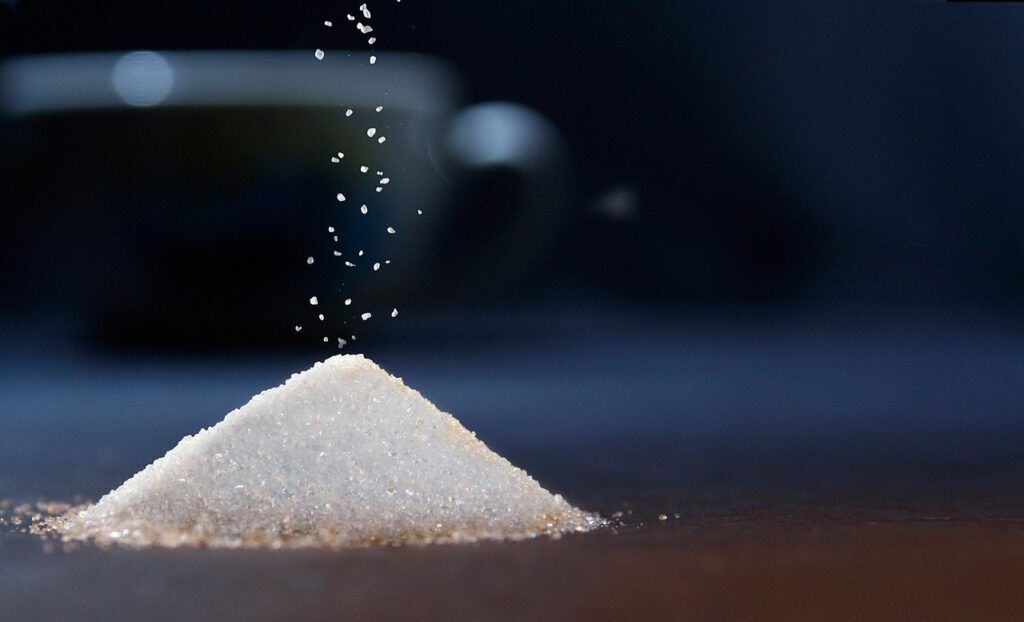
Understanding how our bodies process sugar isn’t just about satisfying curiosity; it’s crucial for managing our health and well-being. When you eat that slice of cake or drink a sugary soda, your body kicks into gear to metabolize the sugar.
But what exactly happens during that process?
The metabolic pathway of glucose and fructose starts the moment they enter your bloodstream. Glucose, a form of sugar, acts as a vital energy source for your body’s cells. As glucose levels rise, your pancreas releases insulin, a hormone that plays a key role. Insulin helps your cells absorb glucose, either to be used immediately for energy or to be stored for future use, especially in muscle and liver cells.
However, not all sugar is created equal. Fructose, found in fruit and many sweetened products, follows a different route. Your liver bears the responsibility of breaking down fructose, and unlike glucose, it doesn’t cause a significant insulin spike. But here’s the kicker: While small amounts of fructose from fruit can be fine, large doses—particularly from sugary drinks and snacks—can overload the liver, leading to the potential storage of excess fructose as fat.
When we think about the long-term effects of excessive sugar consumption on metabolism, a clear picture emerges showing the strain it can put on our bodies. Consuming too much sugar can lead to issues like insulin resistance, a precursor to type 2 diabetes and other metabolic syndromes. Armed with this knowledge, you’re on the right track to understanding how sugar affects your health.
But this is just one piece of the puzzle. Sugar’s journey doesn’t end with metabolism; it has wider implications for our health. In the next section, I’m going to uncover another aspect of sugar – how it acts as fuel for bacteria and yeast in the body, contributing to a range of health issues far beyond just the sugar rush.
Sugar: The Fuel for Bacteria and Yeast
Alright, let’s shift gears and focus on a lesser-known aspect of sugar – its relationship with the microscopic tenants of our body. When you think of sugar, you might typically envision energy for workouts or a guilty pleasure dessert. But did you know that sugar also plays host to bacteria and yeast within our body?
Starting with the basics, our mouth is home to numerous bacteria, some of which are pretty fond of sugar. When we eat foods high in sugar, these bacteria go on a feeding frenzy, releasing acids that can harm our teeth. This is why your dentist keeps telling you to cut down on sweets. It’s not just about cavities; it’s about managing a bacterial banquet in your mouth.
Venturing further into our gut, the plot thickens. Sugar can tip the scales, favoring the growth of certain yeasts, like Candida. Now, while a little Candida isn’t a problem, an overgrowth, however, can lead to discomfort and a variety of symptoms known as candidiasis. This isn’t just a trivial matter; it’s a shout-out to the importance of balancing our sugar intake for maintaining gut harmony.
Staying on top of our sugar consumption is key, but don’t worry too much about the occasional indulgence. It’s about consistent patterns. If you’re downing soda daily, you might need to reassess. However, an occasional slice of birthday cake is part of life’s celebrations.
So, with our attention on how sugar can influence our internal ecosystems, it’s crucial to connect the dots to cognitive health. Let’s get ready to see how sugar not only provides energy but also plays a role in the intricate workings of our brain.
Sugar’s Influence on the Brain
You’ve seen how sugar affects our metabolism and encourages the growth of certain bacteria and yeast, but that’s just a piece of the puzzle. Now, let’s turn our attention to the brain—your command center that’s also sensitive to sugar’s impact.
When you enjoy your favorite sweet treat, your brain’s reward system lights up. The neurotransmitter dopamine floods your system, much like it does with other pleasurable activities. It’s a kind of a ‘natural high’ that can lead to cravings. Just don’t focus too much on perfection here; it’s human to enjoy sweets.
Next, consider the rollercoaster that is your blood sugar levels after a sugary snack. You might feel an immediate boost in energy and mood—a ‘sugar high.’ It’s short-lived, though, often followed by a ‘crash’ that leaves you feeling tired and irritable.
These highs and lows aren’t just fleeting moments. If you’re constantly reaching for sugar, it can alter the brain’s reward pathways, much like addictive substances. Choose something that resonates with you, whether it’s sweet fruits or dark chocolate in moderation, and you can keep those cravings in check.
What’s more, research has highlighted potential long-term effects of high sugar intake on cognitive health, including memory and learning skills. It’s a busy world, and a lot is happening very quickly, but remember, your first attempt doesn’t need to be your last. Taking steps today to manage sugar consumption could be a game-changer for your brain health in the long run.
In wrapping up, your relationship with sugar is multifaceted and nuanced. It can be a source of pleasure and energy, yet an excess can lead to a cascade of negative effects both physically and mentally. By staying informed and making mindful choices, you’re taking control of your health, and that’s something sweet in itself.
We like these to help with the metabolization:
This post may contain affiliate links which means I may receive a commission for purchases made through links. “As an Amazon Associate I earn from qualifying purchases.” I will only recommend products that I have personally used!
